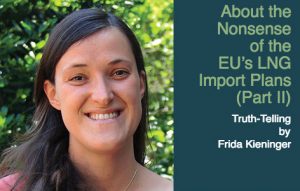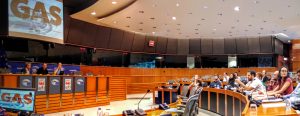
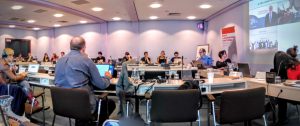

Last month, about 40 activists, campaigners and researchers gathered for three days in Brussels to discuss the problem of gas being the false solution for climate change. The participants of the conference came mainly from different European states, but also from Argentina, North Africa and the United States. What brought all those different people together was the wish to confront the manifold problems that the extraction of natural gas and the construction of more and more gas infrastructure entail.
Resistance to Fracking in North Africa and Argentina
There is the case of Algeria, where a large protest movement opposes fracking projects from France, which ironically banned fracking on its own territory. There is the issue of Tunisians who have to buy gas extracted on their own land like a foreign commodity. And there is the threat that the development in shale gas production in the Maghreb countries could eventually lead to contamination of the Northwestern Sahara Aquifer System, forming the basis of livelihoods for local communities.



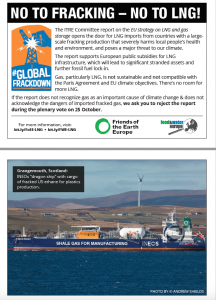 For the Global Frackdown of 2016, Food & Water Europe offers people around the globe the chance to send postcards to Members of the European Parliament with a clear message: “NO liquefied natural gas (LNG)”.
For the Global Frackdown of 2016, Food & Water Europe offers people around the globe the chance to send postcards to Members of the European Parliament with a clear message: “NO liquefied natural gas (LNG)”.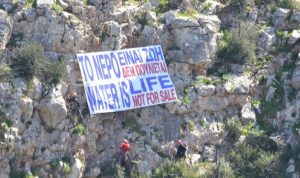 Brexit was a real shock here in Brussels. For the first time, a member state decided to leave the club. It was really tempting to expect a reaction, a debate about the role of EU policies in this collective failure. But this European Union captured by big companies and ruled by a dogmatic neoliberal elite keeps doing business as usual. What happened in the last few weeks in Greece was another brutal example.
Brexit was a real shock here in Brussels. For the first time, a member state decided to leave the club. It was really tempting to expect a reaction, a debate about the role of EU policies in this collective failure. But this European Union captured by big companies and ruled by a dogmatic neoliberal elite keeps doing business as usual. What happened in the last few weeks in Greece was another brutal example.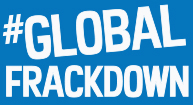
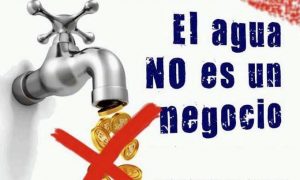 Just one year ago we were arguing about how Spain was still resisting the last wave of water privatization, as a result of austerity policies and debt, seasoned with
Just one year ago we were arguing about how Spain was still resisting the last wave of water privatization, as a result of austerity policies and debt, seasoned with 